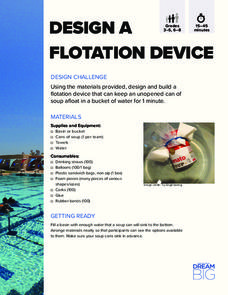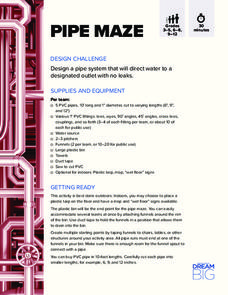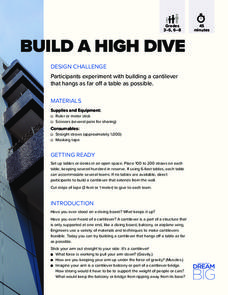Science Matters
Basic Needs
Scholars take part in a grand conversation about the basic needs of living things. Working collaboratively, pupils brainstorm and identify similarities to come to the conclusion that the environment meets the needs of all living things.
Science Matters
Plot Study
Small groups investigate plots of land to discover how abiotic and biotic factors interact. After recording their findings, scholars share observations with peers and self-reflect on the learning process.
Curriculum Corner
Spring Find a Fact Addition
Test scholars' knowledge of addition facts with a festive worksheet that makes adding a two-person game. Pairs examine a grid of numbers to locate and color addition facts. Last person to color three squares wins!
DiscoverE
Slime!!
Who's going to get slimed? Your entire class! Scholars create slime using Borax, water, and white glue. Some food coloring can give the slime a bit of color.
DiscoverE
Textbook Support Challenge
Textbooks are heavier than a sheet of paper, so how can paper hold up a textbook? Young engineers create a structure out of paper that can support a textbook. To add another wrinkle, they must stay within budget and time constraints.
DiscoverE
Tunnel Meetup
Meet me in the tunnels. Scholars choose a tunnel entrance and mark it on their side of the cardboard. They describe the location to their partners and see if they can guess each other's locations. Punching a hole through the cardboard...
DiscoverE
A Clever Way to Water
Your plants will survive without you. Scholars create a device that can water plants using a coiled string. Along the way, they learn about adhesion and cohesion of water. The challenge is to keep the plants alive for at least a week.
DiscoverE
Clean It Up
Water, water, everywhere, but not a drop to drink—until we clean it, of course! Scholars design a filtration device that removes pollutants from water. The goal is to have the water come out as clean as possible from the device. How...
DiscoverE
An Egg-Citing Ride
Wheeeee! Young thrill seekers build a bungee jump—not for themselves, though, but for an egg. The egg must fall from a height of five feet and rebound within two inches of the ground or floor.
DiscoverE
Rocket-Powered Ski Lift
If a ski lift had rockets, imagine how fast it would be! Scholars let their imaginations take flight as they build models for such a ski lift. Rather than using a rocket, though, they'll use a much safer balloon as the power source.
DiscoverE
Dome Home
Homes come in many different shapes and sizes. Building a model of a geodesic dome is the ultimate goal for the activity. Cutting and folding is the way to go here.
DiscoverE
Human Suspension Bridge
When is it okay to be suspended in school? When you're part of a human suspension bridge! Learners first model tension and compression in pairs. Once complete, they get together as a class to model a suspension bridge.
DiscoverE
Human Arch
Sometimes, we all need somebody to lean on. Scholars create a human arch by leaning against each other. They consider different approaches to making the arch sturdier and stronger.
DiscoverE
Seismic Shake-Up!
Shake your earthquake-resistant building prototype! Groups create structures using coffee stirrers and clay that can withstand seismic waves. They then test their structures against their own earthquakes.
DiscoverE
Build an Earthquake-Resistant Structure
Future engineers design and build structures out of toothpicks and marshmallows. They then make sure the structures can withstand an earthquake simulator!
DiscoverE
Creepy Putty
Mold your learners into materials engineers. Using glue, Borax, and water, scholars create a viscoelastic material. But your class might know it by another name—Silly Putty.
DiscoverE
Design a Flotation Device
Save the soup! Scholars devise a flotation device using straws, balloons, foam, corks, and other objects. A can of soup must stay afloat for at least a minute with this device—your dinner might depend on it!
New Jersey Historical Commission and New Jersey Council for the Humanities
Thomas Edison: The Wizard of Menlo Park
What would change in your daily life due to a power outage? Here, learners explore the inventions brought to us by the one and only, Thomas Edison, and imagine a day without them. Scholars take part in a grand conversation and write a...
DiscoverE
Pipe Maze
Here's a lesson that is simply a-MAZE-ing! Introduce science scholars to pipeline systems through a hands-on project. Partnered pupils participate in the design, construct, and test a PVC pipeline maze. Reusable materials and clear...
DiscoverE
Build a Cable-Stayed Bridge
Large or small, bridges are architectural wonders! Construct a large-scale cable-stayed bridge during a whole class project. Scholars work in groups to erect the towers, build the roadway, and secure the cables of their very own bridges....
DiscoverE
Marble Run
It's time to slow your roll! Can your class create a track that allows a marble to roll as slowly as possible? Teams of science scholars collaborate to design, build, and test their tubes while learning about gravity and friction.
DiscoverE
Action Figure Diver
Will your next buoyancy lab rise to the occasion? Make a splash with action figure divers! Teams of young physicists explore the relationship between mass and buoyancy by adding weights or balloons to achieve a diver that neither sinks...
DiscoverE
Designing Highway Interchanges
How do engineers determine the most efficient highway designs? Introduce young scientists to the world of topology, the branch of mathematics that examines how things are connected. Teams use model highways to create the most...
DiscoverE
Build a High Dive
Can't build a cantilever? You'll be able to after a hands-on, constructive activity. Young engineers build cantilevers out of straws and tape. The finished products must be able to hang off a table as far as possible.

























